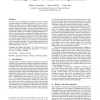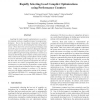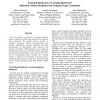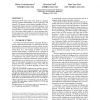125 search results - page 3 / 25 » Rapid Learning for Binary Programs |
103
click to vote
AAAI
2008
15 years 4 months ago
2008
We present a novel application of structured classification: identifying function entry points (FEPs, the starting byte of each function) in program binaries. Such identification ...
113
click to vote
PASTE
2010
ACM
15 years 7 months ago
2010
ACM
We present a novel technique that identifies the source compiler of program binaries, an important element of program provenance. Program provenance answers fundamental questions...
104
click to vote
CGO
2007
IEEE
15 years 8 months ago
2007
IEEE
Applying the right compiler optimizations to a particular program can have a significant impact on program performance. Due to the non-linear interaction of compiler optimization...
230
click to vote
EH
1999
IEEE
1999
IEEE
Evolvable Hardware or Learning Hardware? Induction of State Machines from Temporal Logic Constraints
15 years 6 months ago
Here we advocate an approach to learning hardware based on induction of finite state machines from temporal logic constraints. The method involves training on examples, constraint...
89
Voted
PASTE
2005
ACM
15 years 8 months ago
2005
ACM
Information about string values at key points in a program can help program understanding, reverse engineering, and forensics. We present a static-analysis technique for recoverin...




